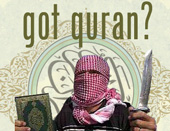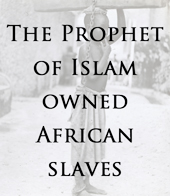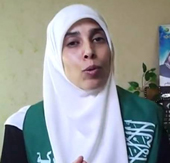Notes
To quote the renowned Muslim Brotherhood cleric, Sayyid Qutb, "It is Allah and not man who
rules. Allah is the source of all authority, including legitimate
political authority. Virtue, not freedom, is the highest value.
Therefore, Allah's law should govern the society; not man's."
According to the Ayatollah Khomeini: "Muslims do not want democracy. Anyone who says democratic republic is an enemy of Islam. All our miseries are caused by those who demand freedom." This is echoed by two recent fatwas posted on Islam Q&A, both of which state that democracy is "contrary
to Islam." Number 07166 says
that "Democracy is a man-made system, meaning rule by the people of the people.... [In Islam]
rule is for Allah and it is not permissible to give legislative rights to any human being."
Number 98134 adds that democracy "is at
war with Islam and its followers," effectively sanctioning violence for the cause of Sharia. Islamic law is based on the Quran and the Sunnah,which are set and fixed.
Laws made by fallible men (particularly non-Muslims) are not necessary; government
need only apply Islamic law. Nor should democratic rule take the
place of Allah's perfect law, which tells us everything we need to know
about daily life (down to which hand a man should "hold it in" while
urinating).
If Allah is not the authority then anything less is a secular dictatorship,
including rule even by a Muslim populace. As an American-Muslim jurist
complained in a recent fatwa, "Democracy gives free reign to the
authority of the Ummah, and puts no ceiling on it."
Also, the law of one person, one vote is essential to democracy but heretical to Islam. According to the
Quran, the testimony of a
woman is worth only half that of a man, and Jews and Christians are
never to have equal standing with Muslims under the law (and certainly never to be in
a position of authority over Muslims). Atheists are to be killed outright.
Reform-minded Muslims prefer to ignore all of this and instead point to
Quran (42:38),
which contains the phrase
"[Muslims] who (conduct) their affairs by mutual consultation." Also recruited as
as evidence that Islam is compatible with democracy is a weaker (non Sahih) hadith in which
Muhammad supposedly says, "My
community will never agree on an error." On this, is based the much
ballyhooed concept of "ijma" or consensus among Muslims for determining
matters of Islamic law.
But ijma, has always been controversial and rarely practiced within
Islam. Some interpret it to mean "consensus of the scholars" - having
nothing to do with the opinion of the community at large. Even when its
legitimacy is recognized, ijma is accepted only as a secondary (or
tertiary) form of authority, behind the fiqh councils.
Also, it bears
pointing out that ijma and consultation are applicable only within the
Muslim community (and probably limited to the "consensus" of males). For example
the main Islamic party in Malaysia, often held up as an example of 'moderation',
said,
in 2018, that, in a well-run government, Muslims make decisions while non-Muslims carry out what has been decided.
American scholar Jamal Badawi (often billed as a 'moderate') says that it is the duty of Muslims to bring
about Islamic rule: "The Quran is full of direct and indirect, implicit and
many times explicit indications that show that the establishment of the Islamic
order is a requirement on Muslims whenever possible." He also scoffs
at secularism: “If a Muslim believes that there is any human being who has
the right to make laws other than Allah then obviously this is total divergence
from the path of Islam. Or any person who believes that secularism is superior
to the law of Allah, he's violating the basic Quranic tenets"
At an Islamic summit in Malaysia, a scholar candidly explained that once Muslims have a majority in a country, Sharia is established and non-Muslims who don't submit will be enslaved. In 2017, the Islamic State
published
an infographic presenting 10 reasons why democracy and Sharia contradict each other.
While most other Islamic scholars may not agree with the tactics of ISIS, the points made seem solid.
That same year, the top Muslim religious advisor for the Australian armed forces was
revealed
to be not only in support of an Islamic extremist group, but an advocate for Sharia over democracy. Sharia is not the fringe issue that apologists often pretend
it to be. During a 2019 Friday sermon in Israel, Sheikh Ahmad Badran assured the faithful that when Muslims rule over infidels "according to Islam" there "will not be a single law that is not Islamic [and] we will not allow a non-Muslim to rule over Muslims." He also pointed out that other Muslims "exploit democracy to come to power" with the same ends in mind. Even Linda Sarsour, a Muslim-American personality who is normally savvy, called for "Jihad" and told an
audience of co-religionists at an ISNA convention in 2017 that "Our top priority is to protect
and defend our community [ie. we Muslims] and not to assimilate or please any other people or authority.
Our top priority is to please Allah and only Allah". When the list of 57 OIC member states
is compared EIU's Democracy Index,
over half (32) are authoritarian regimes, and only six are "flawed democracies."
None are full democracies. Muhammad and the caliphs who succeeded him ruled on Allah's authority
and did not submit their decisions to the
will of the people. Neither is there any tradition of democracy in the
1400 year history of Islam in the Middle East and Persia. If the entire world became Muslim overnight, it
is highly doubtful that democracy would last, since it would be applicable only
to the most mundane of matters not decided by Islamic law.
As another cleric, Sufi Muhammad,
recently put it, "True Islam permits neither elections, nor democracy."
See also Can a Muslim be
loyal to a non-Muslim government?
|





